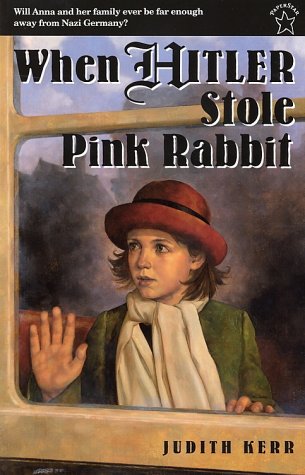 |
| Click to view on Goodreads |
(191 pages)
I like to say that I don't like to read WWII books, but I don't think that's actually true - if I'm being completely honest, I love WWII books. Just not the gritty, horrifying Holocaust books about concentration camps and Nazis and horrible treatment that can make you tremble for humanity. I can read maybe one of those a year - or, actually, every other year - but I can down the other sorts of WWII books by the barrel: books about displacement and identity and bravery, and all the different ways people struggled to find their way in the wake of the most terrible war in human history.
In When Hitler Stole Pink Rabbit, we get the perspective of a little girl whose family flees Germany before the war begins. It's not a tale of cruelty or hatred (though we see hints of that leaking in around the edges through what happens to people they used to know), but instead a book about moving, about trying to fit in, about looking for a place in the world when your own place was destroyed in a way that means it's never coming back.
As I've mentioned before on this blog, I myself have moved many times. I'm actually in the process of moving again - by the time this review goes live, all my earthly possessions will be packed up on a moving truck and on their way back to the Midwest once more. This makes move #7 (not that I'm counting or anything, Mom and Dad!), and I'm beginning to feel like an old pro at this. There's something precious to me about watching Anna and her brother move away from home for the first time, watching them struggle to adapt to their new lives first in Switzerland (where I actually lived for a year, when I was younger!) and then in France. There's something strangely touching in watching the kids become acquainted with homesickness for the first time, with watching Anna bounce back up every time she hits a rock in the road. There's a certain toughness you have to develop when you move, a certain agility that allows you to adapt to your new community, and I loved watching my own experience magnified a thousand-fold as Anna develops these same abilities on a much larger scale than I had to.
I actually chose to write a report for Spanish (yeah, long story) on Judith Kerr, whose own path out of Germany mirrored Anna's. She seems like a fascinating woman, one of the last still alive to have grown up in pre-WWII Germany, and I would absolutely love to sit down and talk with her sometime. Barring that, I will definitely be on the lookout for the sequels to When Hitler Stole Pink Rabbit - and if I ever find them, I will be sure to review them on here. Because this sort of WWII book is my absolutely favorite: the kind that shows the adaptability of the human race, the kind that shows how we can have a "troubled childhood" full of displacement and poverty yet still be perfectly content with the bare necessities of food, friends, and - above all - family to sustain us.
No comments:
Post a Comment
Join the conversation!